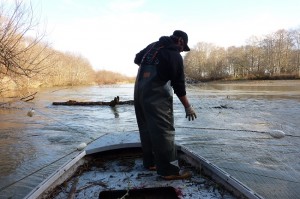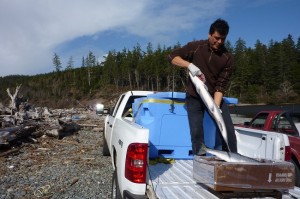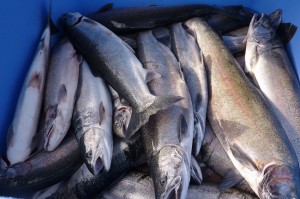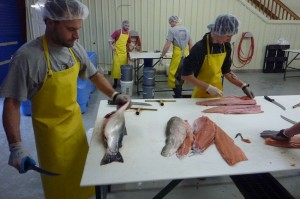Portland Bon Appétit Accounts “Seafood Differently” Through Tribal Program
The Pacific Northwest is a region steeped in tradition, and none so important to the local economy than fishing. Fishermen of the Quinault and Nisqually tribes of Washington have been fishing on the Humtulip and Quinault Rivers for hundreds of years. Generations of fishermen have come and gone, during which grandparents have passed on coveted family fishing spots to their grandsons and daughters in hopes that the practice will live on. It is an important part of the local economy and a way of life for many who enjoy the solitude of the river and the deep connection to the land.
For many years tribal fishermen have sold their fish to larger processors in an anonymous system that collected fish from many different sources. The tribal-caught fish sold under this system lost the identity and rich story behind the food, increasing the disconnect between growers and eaters. Fishermen were paid unreliable prices for their fish (often below a living wage) and the high-quality product did not get the recognition it deserved. So in 2010 the Affiliated Tribes of Northwest Indians came together to set up the Salmon Marketing Program.
The program buys fish caught by tribal members on tribal land, pays the fishermen a sustainable living wage, processes the fish at a facility owned and operated by the community, and then distributes the products itself to ensure the integrity of the process. It brings together fish caught by numerous small fishermen who are part of at least 17 different Washington Tribes. It adds value to tribal fishers’ and harvesters’ catches and keeps more of the value-added chain in Indian Country. Since its inception in 2010, the program staff and stakeholders have assisted more than 125 tribal fishers, harvesters, individuals, and businesses, generating an economic impact of over $1 million through new sales, increased revenues, and higher premiums. The program has expanded to new markets — and Bon Appétit is proud to be a customer.
This spring I was invited to see the program for myself and meet the people catching the fish served in some of our Portland, OR, cafés.
Sonny Davis, a born and raised Quinault Tribal member, founder of the Salmon Marketing Program, and owner of Sea-Atco Seafood, was my guide for the day. We began by visiting SMP’s processing facility in Olympia, WA, and then drove west to the Humtulip and Taholah Rivers (near Aberdeen, WA) to purchase salmon. Sonny drove us down windy, unmarked dirt roads through groves of trees on protected tribal land to get to the five different tribal fishermen from whom we were buying that day.
It is hard to convey what makes this program so special without actually seeing it for yourself, but what stood out to me was the sense of community it builds. All these fishermen know each other and have a deep sense of trust in one another. For the fishermen coming from different tribes (that may traditionally have bad blood between them), this has been a positive uniting force for the native community of Washington.

Quinault Tribal Fisherman, Archie, goes out on the Humtulip River to pick up his last catch of the day, a salmon caught in the gill net.
In addition, there is a great sense of mutual respect between the seller and buyer: Sonny grew up fishing in the area with his family, so he understands the perspective of the fishermen even though he is the distributor. He does everything to make the selling process as easy as possible on the fishermen while ensuring quality and safety standards are maintained. Something as seemingly simple as providing the fishermen with plenty of ice to store the fish and cleaning the crates after each pickup go above and beyond what most buyers would do for their fishermen. Lastly, this program ensures a fair and consistent wage and a sustainable livelihood for fishermen who were often taken advantage of by larger purchasers.
It was an honor to spend the day with these fishermen, and Bon Appétit is proud to be featuring their products in our Portland locations such as Reed College and RA1 Café.


